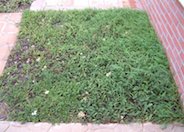
Common name:Climbing Rose
Botanical name:Rosa Climbing varieties
With its dark green foliage and fragrant flowers with full and double blooms, this upright shrub is generally grown as a vine or pillar rose. Climbing varieties come in many colors.

Common name:California Poppy, Golden Poppy
Botanical name:Eschscholzia californica
This small annual (sometimes acts as a perennial) plant will grow to less than 1' tall and has light, small blue green leaves with gold and orange flowers that bloom in spring and summer.

Common name:Hybrid Tea Rose (selections)
Botanical name:Rosa Hybrid Tea varieties
These shrubs and vines are the most loved in the Western USA and are very resilient. They come in a wide variety of sizes and colors and are easy to maintain with proper care. They can be used in a water-conserving garden with careful attention to irrigation practices.

Common name:Woolly Yarrow
Botanical name:Achillea tomentosa
Short stems of flat-topped golden flowers accent the deep green, woolly, fern-like leaves of the mat formed by this plant. It is a fine performer in rock gardens and at the front of herbaceous perennial borders. Yarrow propagate easily from rooted stems or division, which should be performed in the early spring or fall. Following bloom, dead head the plant and divide the clumps when it appears crowded.

Common name:Krauter Vesuvius Flowering Plum
Botanical name:Prunus cerasifera 'Krauter Vesuvius'
The 'Krauter Vesuvius' is a smaller growing, flowering plum that grows to 18' high by 12' wide. Its leaves are purplish black throughout the growing season, and the flowers have a light pink color.
Designer:
Photographer: GardenSoft
Incorporate compost 6" into your soil to retain water, reduce compaction, feed earthworms, and provide valuable nutrients to your plants.
Remove irrigation water and fertilizer from areas where you don't want weeds to grow.